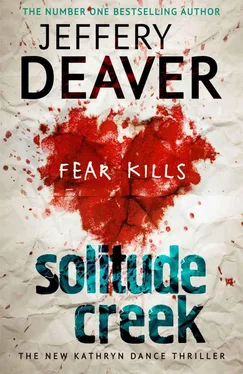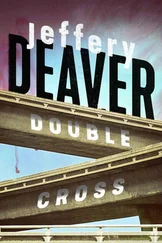March vetoed the idea. No. This was the way to handle it.
Which irritated the Get, and for a moment March felt inflamed and edgy.
Fuck you, he thought. I’ve got some say in this.
Silently the two men stepped behind the front door. March looked out of the peephole, gripping the hammer he’d break Scanlon’s arm with as soon as he walked inside, grab his gun.
He saw the young man walking, head down, to the gate in the picket fence in front of his house. He opened it and started up the winding walk, minding where he put his feet. If Scanlon had front lights he hadn’t turned them on.
Scanlon walked onto the low porch, then stepped to the side. They heard the mailbox open. A brief laugh, faint, at something he’d received — or hadn’t received. Then gritty footsteps on the redwood planks, moving toward the front door.
The sound of a key in the lock.
Then... nothing.
Jenkins turned, frowning. March took a firmer grip on the hammer. He peeked outside through a curtained window. He was staring at the empty porch.
‘Leave!’ March whispered harshly. ‘Now!’
Jenkins frowned but he followed March instinctively. They got only three feet back into the living room when a half-dozen Monterey County Sheriff’s deputies, in tactical gear, flooded into the room from behind the beads covering the doorway to the kitchen. ‘Hands where we can see them! On the ground, on the ground! Now!’
And the front door exploded inward. Two other tactical officers charged in too. Scanlon, his own weapon drawn, followed.
‘Christ!’ Jenkins cried. ‘No, no, no...’
March backed up, hands raised, and eased to his knees. Jenkins started to, as well, but his hand dropped to his side, as if to steady himself as he sank down.
March looked at his eyes. He’d seen the expression before. The gaze wasn’t defiance. It was resignation. And he knew what was coming next.
Calmly he said to Jenkins, ‘No, Chris.’
But what was about to happen was inevitable.
The small pistol was in the man’s tanned hand, drawn leisurely from his hip pocket. He swung it forward but it got no farther than four o’clock before two officers fired simultaneously. Head and chest. Huge explosions that deafened March. Jenkins crumpled, eyes nearly closed, and landed in a pile on the floor.
‘Shots fired. Suspect down. Medic, medic, medic!’ One officer who’d fired dropped his radio and hurried forward, pistol still pointed toward Jenkins, though from the spatter it was clear he was no threat. Another two cuffed March.
The policeman removed the small gun from Jenkins’s hand, unloaded it and locked the slide back.
The others hurried through the place, opening doors. Shouts of ‘Clear!’ echoed.
March continued to gaze down at his boss.
Maybe Jenkins had actually believed he could shoot his way out of the situation. But that was unlikely. He’d chosen to take his own life. It wasn’t uncommon; suicide by cop, it was called. For those who lacked the courage to put a gun to their head and pull the trigger.
He stared at Jenkins’s body on the floor, the blood spreading in the shag carpet, a twitch of a finger.
Other officers streamed inside, accompanying two emergency medical technicians. They bent to the fallen man. But a fast check of vitals confirmed what was obvious.
‘He’s gone. I’ll tell the ME.’
Another man, in a body-armor vest, walked inside and looked down at his captives. He recognized him from outside the movie theater the other morning and from the Bay View Center. Kathryn Dance’s colleague.
‘Detective O’Neil,’ one of the deputies called. ‘We’re clear of threat.’ The officer handed O’Neil March’s wallet. Jenkins’s too. O’Neil flipped through them.
He walked to the door and said, ‘It’s clear, Kathryn.’
She walked inside, glancing at the corpse matter-of-factly. Then her green eyes fixed on March’s. He felt an odd sensation, looking at her. Was it a comfort? He believed so. Outrageous, under the circumstances. But there it was. He nearly smiled. She was even more beautiful than he’d believed. And how much she resembled Jessica!
O’Neil handed her the men’s IDs. ‘The deceased’s Chris Jenkins.’ Then a nod. ‘And you got it right, Kathryn. He’s Antioch March.’
Got it right?
He wasn’t the least surprised his beautiful Kathryn had out-thought him.
‘Read him his rights and let’s get him to CBI.’
‘It was the lights, Antioch.’
‘Andy, please. Lights?’
‘The lights in the security cameras of the venues where you staged the attacks.’
Dance scooted her chair closer, here in the larger of the interview rooms, the one, in fact, where the Serrano incident had begun. She was already wearing her dark-framed predator specs. Examining March carefully. A trim-fitting light blue dress shirt, dark slacks. Both seemed expensive. She couldn’t see his shoes from where she sat: were they the five-grand pair?
He still seemed a bit mystified at the officers’ sudden appearance at TJ’s, though the explanation was rather simple.
Just after the Neil Hartman concert had started Dance had found herself thinking once more of her observation a few moments earlier: about the security lights at the hospital, and at the venues the unsub had attacked. They’d all been been equipped with lights, while most security cameras — like the ones she’d just noted at the Performing Arts Center — were not. She recalled the witnesses telling her that bright lights had come on around the time of the panic at the roadhouse and the author’s signing; she herself had seen them blazing from the camera in the elevator.
She’d ducked into the lobby of the concert hall and, from her phone, checked the photos of the three crime scenes. The cameras were all the same.
She told March this and added, ‘All the venues had just been inspected by an insurance or fire inspector, I remembered. Except it wasn’t an official. It was you, mounting the cameras when the manager wasn’t looking. Fire Inspector Dunn.’
Dance continued, ‘You moved lamps over two of your other victims: Calista Sommers and Stan Prescott. Oh, I see your expression. Yes, we know about Calista. She’s not Jane Doe any more. We finally got her ID. Missing-person memo from Washington State.
‘Calista... Stan Prescott. And Otto Grant. He was hanged in front of an open window. Lots of light there, as well. Every time somebody died because of you, you wanted lights. Why? For Calista and Prescott, we thought it was to take pictures of the bodies. Were you filming at the venues too?’
Just after she’d had this thought, at the concert hall earlier, she’d called O’Neil and had a crime-scene team seize and dismantle the security camera in the elevator. They found a cellular module in it.
She had remembered that at Solitude Creek she’d wondered why the security video that Sam Cohen had shown them seemed to come from a different angle than that of the camera she’d seen in the club. That was, she realized, because there were two cameras — with March’s pointed, as Trish Martin had said, at the blocked exit doors. To see the tragedy most clearly.
‘The cameras were streaming the stampedes, full high-def, brightly lit. But why? So Grant could gloat over his revenge? Maybe. But if he planned to kill himself he wouldn’t be around very long to enjoy the show.’ Through the lenses of the steely glances Dance probed his face. ‘And then I remembered the bucket.’
‘Bucket?’
‘Why did Grant have a bucket for a toilet? If he’d vanished on his own, well, wouldn’t he just go outside for the bathroom? Kidnappers have buckets for the victims to use because they’re handcuffed or taped.’
Читать дальше












